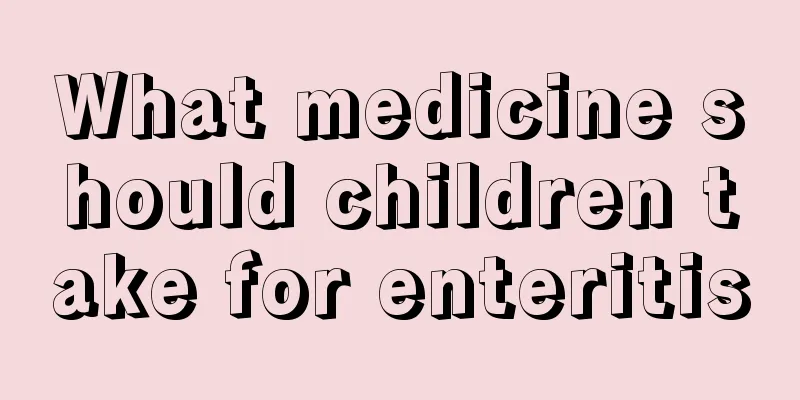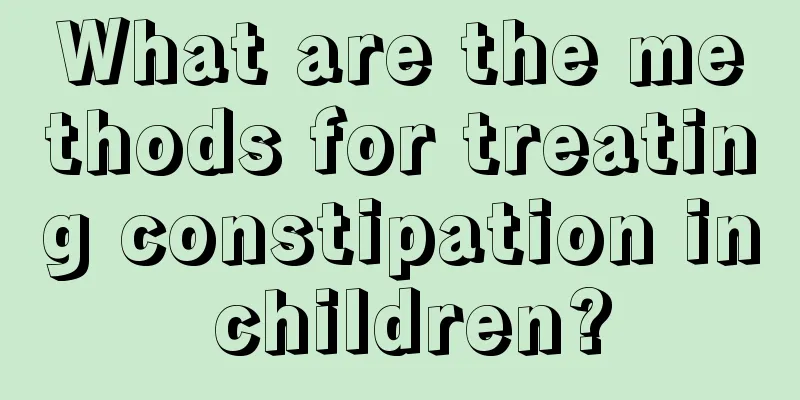What medicine should children take for enteritis

|
Children's stomachs are relatively weak. If they catch a cold or have unhygienic diets, they often develop symptoms of enteritis. At this time, they are prone to abdominal pain, diarrhea, nausea, vomiting and other symptoms. They may even have electrolyte imbalance and dehydration. When children have similar symptoms, they must be treated in time. First of all, they must pay attention to diet conditioning. If the condition is more serious, they should fast first. When the condition is mild, they can eat some liquid food to gradually restore gastrointestinal function. In addition, for bacterial enteritis, antibiotics can be used for treatment. For more serious cases of dysentery, dehydration is likely to occur, and intravenous drips are required at this time. 1. Antibiotics: Bacterial enteritis can be treated with antibiotics. Because bacterial resistance to drugs is gradually changing, medications must be taken under the guidance of a physician and according to the physician's prescription. Some patients stop taking medication as soon as their symptoms improve. As a result, they develop chronic colitis due to insufficient medication, which does not heal over time and affects the nutrition and health of children. 2. Diet: When diarrhea is severe, feeding should be temporarily stopped to allow the gastrointestinal tract to rest. After the condition improves, you can start by feeding the baby with rice soup or diluted skim milk, and then gradually increase the concentration. Do not fast for too long to avoid malnutrition. In addition, pay attention to vitamin supplementation. Certain sick children and those suffering from allergic diarrhea need special dietary treatment and should seek the guidance of a doctor. Diarrhea in children may seem very common, but it is also the disease with the highest mortality rate. Therefore, patients with severe cases should not take medicine on their own and must seek medical advice for treatment and prescription. 3. Intravenous drip: The most dangerous thing about diarrhea is dehydration. Children are more susceptible to dehydration than adults. In severe cases, the body weight may be dehydrated by more than 1/10, and the mortality rate from dehydration can reach 30%. Replenishing water can reduce the mortality rate to below 5%, so the best treatment for diarrhea is intravenous drip. When the disease is serious, the intestines are swollen and cannot absorb water. The child will have diarrhea every time he drinks water. In this case, the child must receive intravenous treatment and supplement with saline and glucose. When acidemia is severe, alkali solution should be supplemented, and when potassium is deficient, potassium should be supplemented. In addition to replenishing nutrients, water, electrolytes and water, the drip also has an antidiarrheal effect. When all antidiarrhea drugs are ineffective, intravenous drip is the best antidiarrhea treatment. |
<<: What's wrong with the white spots on the child's face?
>>: Indications for children's amoxicillin dry suspension
Recommend
What should children eat for herpetic pharyngitis
In addition to the general dry pharyngitis, there...
Popularization of knowledge about Henoch-Schonlein purpura nephritis in children
Children's physical fitness is worse than our...
What to do if your child is allergic to milk powder
Nowadays, children are generally not breastfed, b...
What should I do if my child has bad breath? Normal treatment for bad breath in children
Bad breath in babies is a common oral disease, wh...
What should I do if my baby has a wind-heat cold?
Colds are very common in the summer, and wind-hea...
What is the reason for the blood in the stool of a ten-month-old baby?
Mothers who have just had a baby should pay atten...
How to relieve nasal congestion in children
As parents, we will naturally feel distressed whe...
Can children drink enzymes?
In recent years, enzymes have become popular in m...
The harm of picky eating in children
I believe that as parents, we can fully understan...
Are hemangiomas in children serious?
Childhood hemangioma mainly refers to problems th...
How to treat nausea and diarrhea in children?
The baby's nausea and diarrhea are mostly cau...
Causes of abdominal lymph nodes in children
Children's health needs a lot of attention. M...
What's wrong with the bloodshot on the child's face?
If there are blood streaks on the skin on the fac...
What causes fecal incontinence in boys?
Under normal circumstances, the human body is abl...
What are the red spots on the baby's face?
What should you do if your baby has red spots on ...









